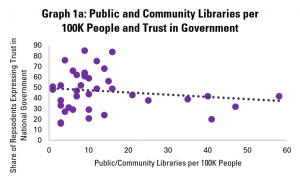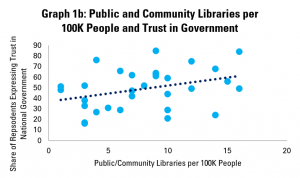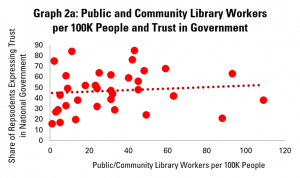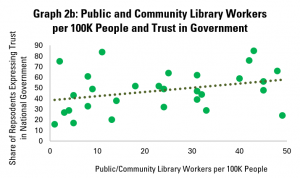Trust in government matters.
During the COVID-19 pandemic, the level of confidence people have in the ability of those that rule to be taking the right decisions, in the interests of the country, has arguably had a significant impact on the likelihood of following health advice.
Yet this is also important in more ‘ordinary’ times, with the effectiveness of policies often depending, at least in part, on whether people have trust in those making and implementing them.
This is one of the reasons why the Sustainable Development Goals (SDGs) include SDG16, focused on questions of good governance and strong institutions.
What drives this trust?
A number of factors can come into play, starting of course with the behaviour of politicians and officials. However, information can play a role, with more informed citizens feeing more involved in decision-making. Similarly, a feeling of having access to public services can also help.
Libraries can, arguably, play a role in both of these, helping people to inform themselves more readily, as well as being a visible example of public service in the community.
So what does the data say? To find out, we crossed data from the IFLA Library Map of the World with data from the Gallup World Poll on trust in government (measured simply by asking a representative sample of adults whether they trusted national government), reported through the Organisation for Economic Cooperation and Development’s Government at a Glance publication.

Graph 1a starts by looking at the relationship between numbers of public and community libraries per 100 000 people and the share of the population declaring that they feel trust in government (data from 2019). Each dot represents one country.
Overall, this indicates a small but negative relationship here, although one with a very loose correlation.
To explore further, and following the finding in a previous blog focused on social capital that the correlation between numbers of libraries and affective outcomes (such as trust in other people) can tail off after a certain point, we therefore also looked at the correlation only for countries with up to 20 public libraries per 100 000 people. To note, the average number of public and community libraries per 100 000 people in Western Europe is 14.6, in North America, 5.7, and in the world as a whole, 6.4.

Graph 1b does this, immediately showing not only a positive relationship, but also a stronger degree of correlation. In effect, this supports the idea that, at least up to an above-average number of public libraries per 100 000 people, more libraries tends to mean stronger levels of trust in government.

Graph 2a repeats the analysis, but this time looking at numbers of public and community library workers per 100 000 people. Considering all countries for which data is available, there is a positive, but weak correlation between numbers of library workers and trust in national government.

Graph 2b then focuses in only on countries with up to 50 public and community library workers per 100 000 people. For reference, this compares to an average of 28.7 for Western Europe, 29 for North America, and 11.8 for the world.
Once again, this indicates a stronger positive connection, indicating that where there are more public and community library workers, there is stronger trust in government.
As ever, correlation does not mean causality – governments that invest in libraries may well also invest in other services that lead to higher levels of confidence and trust among citizens.
Nonetheless, the data presented here indicate that, at least among countries which do not already have a high number of libraries and library workers already, a stronger library field tends to be associated with greater confidence in government.
Find out more on the Library Map of the World, where you can download key library data in order to carry out your own analysis! See our other Library Stats of the Week! We are happy to share the data that supported this analysis on request.